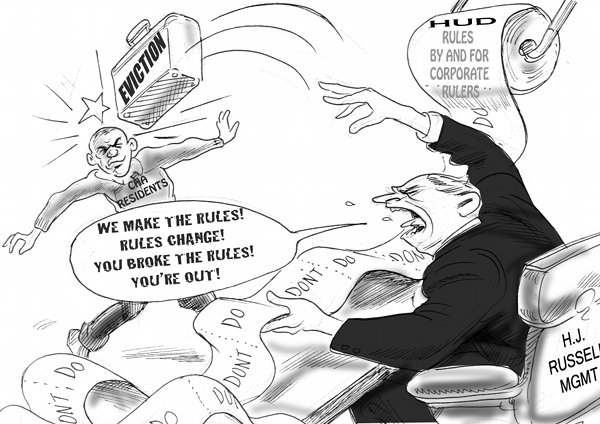
March 6, 2013 marks the 156th anniversary of the U.S. Supreme Court’s Dred Scott decision in which Chief Justice Roger B. Taney declared that African Americans “had no rights which the white man was bound to respect; and that the Negro might justly and lawfully be reduced to slavery for his benefit. He was bought and sold and treated as an ordinary article of merchandise and traffic, where ever profit could be made by it.”
We who live in public housing are frequently reminded that we have no rights. One such case is that of Jeffie Carroll, a 51-year-old unemployed Cabrini resident who is facing eviction for “bad house keeping.” Mr. Carroll failed a house inspection in March of 2011. A short time later he was summoned to the H.J. Russell management office and was given a 30-day eviction notice. After reading the notice, he disputed the validity of some of the statements in the notice and orally requested an informal grievance. He was denied. He returned the next day and asked for an informal grievance request form and was again denied. HUD regulations require that forms be available upon request and that the Grievance Procedure Manual which includes the forms be posted in a conspicuous manor in the management office. The manual was not posted.
Furthermore, when Jeffie signed his lease in 2010, he should have received the Lease Part I: Terms and Conditions, the Admissions and Continued Occupancy Policy (ACOP) and the CHA Grievance Procedure Manual along with them “thoroughly explained” as stated on page 26 of the lease. “I didn’t get any of that,” says Carroll. He also says, “I didn’t get anything in writing on what to do to pass inspection.” After much persistence, his grievance reached CHA and he received a letter from their Deputy General Counsel Elizabeth Silas. He was again denied on the basis that he cannot grieve policy. This seems counter to HUD regulations which exclude grievances in evictions only for violent criminal or drug activity, and arrest that leads to felony conviction.
It should be noted that there is a difference between policy and the way it is carried out by private management corporations like H.J. Russell. Jeffie Carroll is currently defending himself in eviction court without a lawyer before Judge Orville Hambright. He has lived in Cabrini since 1990 and yet it is now that he is being evicted. What is different now? The answer is all CHA properties are now managed by private corporations. H.J. Russell has conducted mass evictions ever since they got the contract to manage in Cabrini, and even though it is against HUD regulations, they receive money for empty apartments the same as if they were occupied.
The slave masters of old have been replaced by these corporations. We have no rights which they are bound to respect. In their lust for maximum profits they reduce us to a fate that may be worse than slavery, i.e., miserable homelessness, hunger and death on the streets. We fought the Civil War to rid ourselves of the slave masters. What’s it going to take to rid ourselves of corporate rule?
